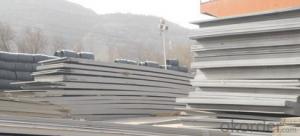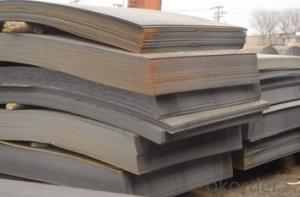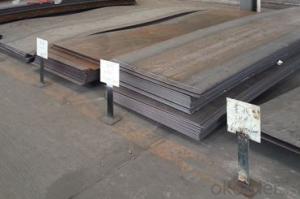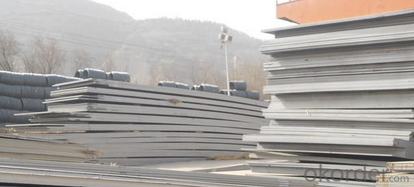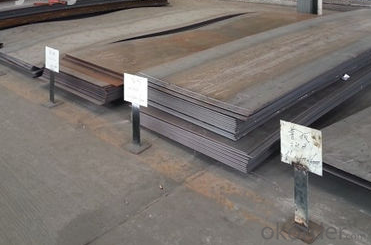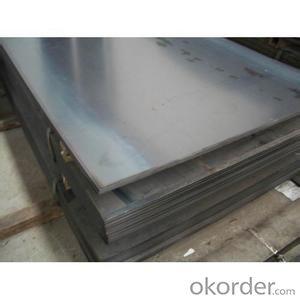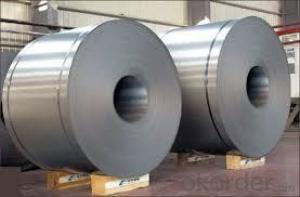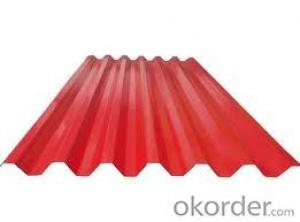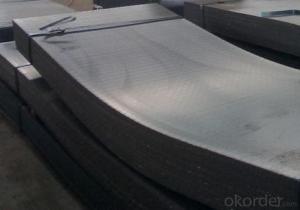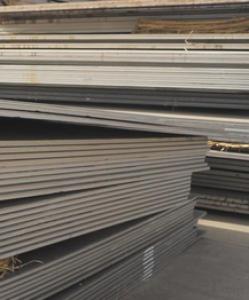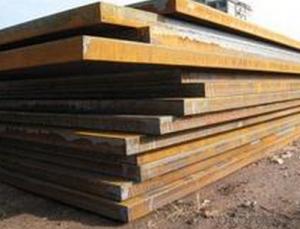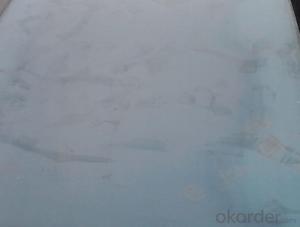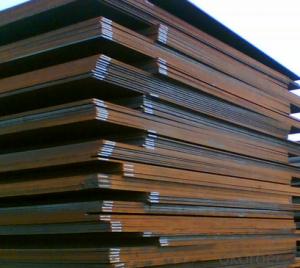Hot Rolled Carbon Steel Plate,Carbon Steel Sheet 19Mng, CNBM
- Loading Port:
- Qingdao
- Payment Terms:
- TT OR LC
- Min Order Qty:
- 10 pc
- Supply Capability:
- 30 pc/month
OKorder Service Pledge
OKorder Financial Service
You Might Also Like
Quick Details
| Standard: | AISI, ASTM, GB, JIS | Grade: | Q195,Q235,Q345,A36,C45 | Thickness: | 1.0-30MM |
| Model Number: | Q235,Q195,Q345 | ||||
| Type: | Steel Plate | Technique: | Hot Rolled | Surface Treatment: | Coated |
| Application: | Ship Plate | Special Use: | Silicon Steel | Width: | 30-2000mm |
| Length: | as your requirement | standard: | hot rolled | Surface: | Anti-rust oil |
Packaging & Delivery
| Packaging Details: | seaworthy packages or as customers' require |
| Delivery Detail: | within 15 days after the advance payment |
Hot rolled steel plate
1 carbon steel plate 3mm thick General information
| Product name | Type | Specification | Implementation of GB | ||
| thick | wide | long | |||
| Carbon structural steel | Q195,Q215, Q235A,Q235B, Q235C,Q255, Q275 | 4-120 | 1500-4500 | 6000-12000 | GB/T700-2006 |
| Low-alloy structural steel | Q295,Q345A, Q345B,Q2345C | 4-120 | 1500-4500 | 6000-12000 | BG/T1591-1994 |
| Quality carbon structural stee | 30-50 | 4-120 | 1500-4500 | 6000-12000 | BG/T699-1999 |
| Ship steel | CCSA,CCSB | 4-120 | 1500-4500 | 6000-12000 | materials and welding condition |
| CCSAH32,CCSAH36 CCSDH32,CCSDH36 | 4-120 | 1500-4500 | 6000-12000 | materials and welding condition or GB 712-2000 | |
| Boiler steel | 20g,22Mng, 16Mng,19Mng | 4-120 | 1500-4500 | 6000-12000 | GB 713-1997 |
| Pressure vessel steel | 1622Mng,20R, 15MnVR,15MnVNR | 4-120 | 1500-2700 | 6000-12000 | GB 6654-1996 |
| European standard plate
| S235JR,S235J0, S275JR,S275J0, S275JR2,S355JR, S355J0,S355J2 | 4-120 | 1500-4500 | 6000-12000 | EN 10025 |
| Japanese standard plate | SS400,SS400-B | 4-120 | 1500-4500 | 6000-12000 | JIS G3101-2004 |
2 carbon steel plate 3mm thick detail specification
Material:
A283Gr.D/A573Gr.65,A516Gr65,A516Gr70,A284Gr.D
SS400,SS300,CCSB A36,A32,LRA32,LRB,Q235
Q195,Q235,Q345,SS400,ASTM A36,E235B
Thickness: 4mm-120mm
width: 1500mm-4500mm
Length:2-10m ,accordingly
Thickness | 4-120mm |
Width | 1500-4500mm or as custom's request |
Length | 2-12m,as your requirment |
Technique | Cold rolled or hot rolled |
Surface treatment | Bare, galvanized coated or as customer's requirements. |
Standard | ASTM,EN,GB,JIS,GB |
Material | A283Gr.D/A573Gr.65,A516Gr65,A516Gr70,A284Gr.D SS400,SS300,CCSB A36,A32,LRA32,LRB,Q235 Q195,Q235,Q345,SS400,ASTM A36,E235B |
Terms of Payment | L/C or T/T |
Chemical composition | C≤0.004%;Si≤0.030%; Mn ≤0.17%;P≤0.012%; S≤0.010%; Fe balance |
Delivery Detail | within 30days once receive deposite or confirm L/C |
Packing | Standard export packing,or as requirement |
3 carbon steel plate 3mm thick application:
construction,machinery manufacturing, container manufacturing, shipbuilding, bridge construction. Can also be used to manufacture a variety of containers, the furnace shell, furnace plate, bridge and vehicle static steel plate, low alloy steel plate,shipbuilding plate, boiler plate, pressure vessel plate, pattern plate, tractor parts, automobile frame steel plate and welding components
- Q: Can steel sheets be used for magnetic applications?
- Indeed, magnetic applications can make use of steel sheets. However, it should be noted that not all steel types possess magnetic properties. Steel can be divided into two primary categories: ferromagnetic and non-ferromagnetic. Ferromagnetic steel comprises iron, nickel, and cobalt, which are materials capable of being magnetized. Conversely, non-ferromagnetic steel lacks these materials and is not magnetic. Ferromagnetic steel sheets find widespread application in magnetic uses such as transformers, motors, generators, and magnetic shielding. These sheets are preferred due to their ability to efficiently conduct and amplify magnetic fields. On the other hand, non-ferromagnetic steel sheets, while not magnetic themselves, can still be employed in magnetic applications as structural components or as part of a magnetic system where the magnetic field requires control or manipulation. When selecting steel sheets for magnetic applications, careful consideration must be given to the specific magnetic properties required for the intended use, and the appropriate type of steel should be chosen accordingly.
- Q: How do steel sheets compare to other materials like aluminum or plastic?
- Steel sheets have several advantages over other materials like aluminum or plastic. Firstly, steel is much stronger and more durable than both aluminum and plastic. It has a higher tensile strength and can withstand much greater loads and impacts. This makes steel sheets more suitable for applications that require high strength and structural integrity, such as construction, automotive, and aerospace industries. Secondly, steel is more resistant to extreme temperatures and fire compared to aluminum or plastic. Steel sheets have a higher melting point, making them less likely to deform or lose their structural integrity under high temperatures. This makes steel sheets ideal for applications that involve exposure to heat or fire, such as industrial furnaces or fire-resistant structures. Furthermore, steel sheets offer better corrosion resistance than aluminum or plastic. Steel can be coated with various protective layers like zinc or paint to prevent rusting and corrosion. Aluminum, on the other hand, is prone to corrosion in certain environments. Plastic, although generally resistant to corrosion, may degrade and become brittle over time. Therefore, steel sheets are a more reliable choice in applications where exposure to moisture or corrosive substances is a concern, such as marine environments or chemical processing plants. Lastly, steel sheets are more environmentally friendly than both aluminum and plastic. Steel is a recyclable material and can be reused indefinitely without losing its properties. Aluminum recycling requires significantly more energy, and plastic is known to have a detrimental impact on the environment due to its slow decomposition. Steel sheets, being recyclable and sustainable, are a preferred choice for those seeking environmentally friendly options. In conclusion, steel sheets outperform materials like aluminum or plastic in terms of strength, durability, resistance to extreme temperatures and corrosion, as well as being more environmentally friendly. However, the specific choice of material ultimately depends on the application requirements, cost considerations, and other factors.
- Q: Can steel sheets be used for shipping containers?
- Yes, steel sheets can be used for shipping containers. In fact, steel is the most common material used for constructing shipping containers due to its durability, strength, and ability to withstand harsh conditions during transportation.
- Q: How do steel sheets perform in high-pressure environments?
- In high-pressure environments, steel sheets demonstrate remarkable resilience and exceptional performance. Their inherent strength and durability enable them to withstand and effectively contain the immense pressure exerted upon them, making them the preferred choice in pressure vessels, pipelines, and industrial machinery. While the high-pressure environment subjects materials to significant stress, steel sheets possess the ability to resist deformation and maintain their structural integrity. Their exceptional tensile strength and capacity to withstand compressive forces without buckling or breaking establish them as a reliable option for withstanding high pressure. Moreover, steel sheets are renowned for their excellent corrosion resistance, a crucial characteristic in high-pressure environments. This resistance plays a pivotal role in preventing potential leaks or failures resulting from the weakening effects of corrosion. To further enhance their corrosion resistance, steel sheets can be coated or treated, making them even more suitable for demanding applications. Additionally, steel sheets offer a high level of versatility, readily fabricated into various shapes and sizes to meet precise requirements. This adaptability allows for the customization of steel sheets, ensuring optimal performance in a range of industrial settings and high-pressure environments. In conclusion, steel sheets exhibit exceptional reliability and excel in high-pressure environments. Their strength, durability, resistance to deformation, and corrosion resistance establish them as the preferred choice for applications requiring containment of high-pressure substances.
- Q: Can steel sheets be used for noise reduction purposes?
- Yes, steel sheets can be used for noise reduction purposes. Steel has excellent soundproofing properties due to its density and ability to dampen vibrations. It is often used as a barrier material in construction projects to reduce noise transmission between different areas.
- Q: How do steel sheets perform in sound insulation?
- Steel sheets do not perform well in sound insulation as they are rigid and have poor sound-damping properties.
- Q: Are steel sheets suitable for playground equipment?
- Yes, steel sheets can be suitable for playground equipment. Steel is a durable and strong material that can withstand heavy use and various weather conditions. It can be used to create structures like climbing frames, slides, and swings, ensuring the safety and longevity of the playground equipment.
- Q: What is the lifespan of steel sheets?
- The lifespan of steel sheets can vary depending on various factors such as the quality of the steel, the environment it is exposed to, and the level of maintenance. However, on average, steel sheets can last for several decades or even up to a century if properly maintained.
- Q: Can steel sheets be recycled after use?
- Yes, steel sheets can be recycled after use. Steel is a highly recyclable material, and recycling steel sheets helps to conserve energy and reduce the need for raw materials in steel production.
- Q: Are steel sheets resistant to termite infestation?
- Steel sheets do not possess resistance against termite infestation. Although termites primarily consume wood and other cellulose-based materials, they can indirectly harm steel structures. Termites are capable of tunneling through various substances like concrete or insulation in order to access the wooden parts of a construction. Consequently, even though termites may not directly affect the steel sheets themselves, they can still jeopardize the overall stability of a building or structure if they manage to infiltrate the wooden components. Hence, it is crucial to implement preventative measures, conduct regular inspections, and apply treatments to vulnerable areas to safeguard against termite infestation, regardless of the presence of steel sheets.
Send your message to us
Hot Rolled Carbon Steel Plate,Carbon Steel Sheet 19Mng, CNBM
- Loading Port:
- Qingdao
- Payment Terms:
- TT OR LC
- Min Order Qty:
- 10 pc
- Supply Capability:
- 30 pc/month
OKorder Service Pledge
OKorder Financial Service
Similar products
Hot products
Hot Searches
Related keywords
